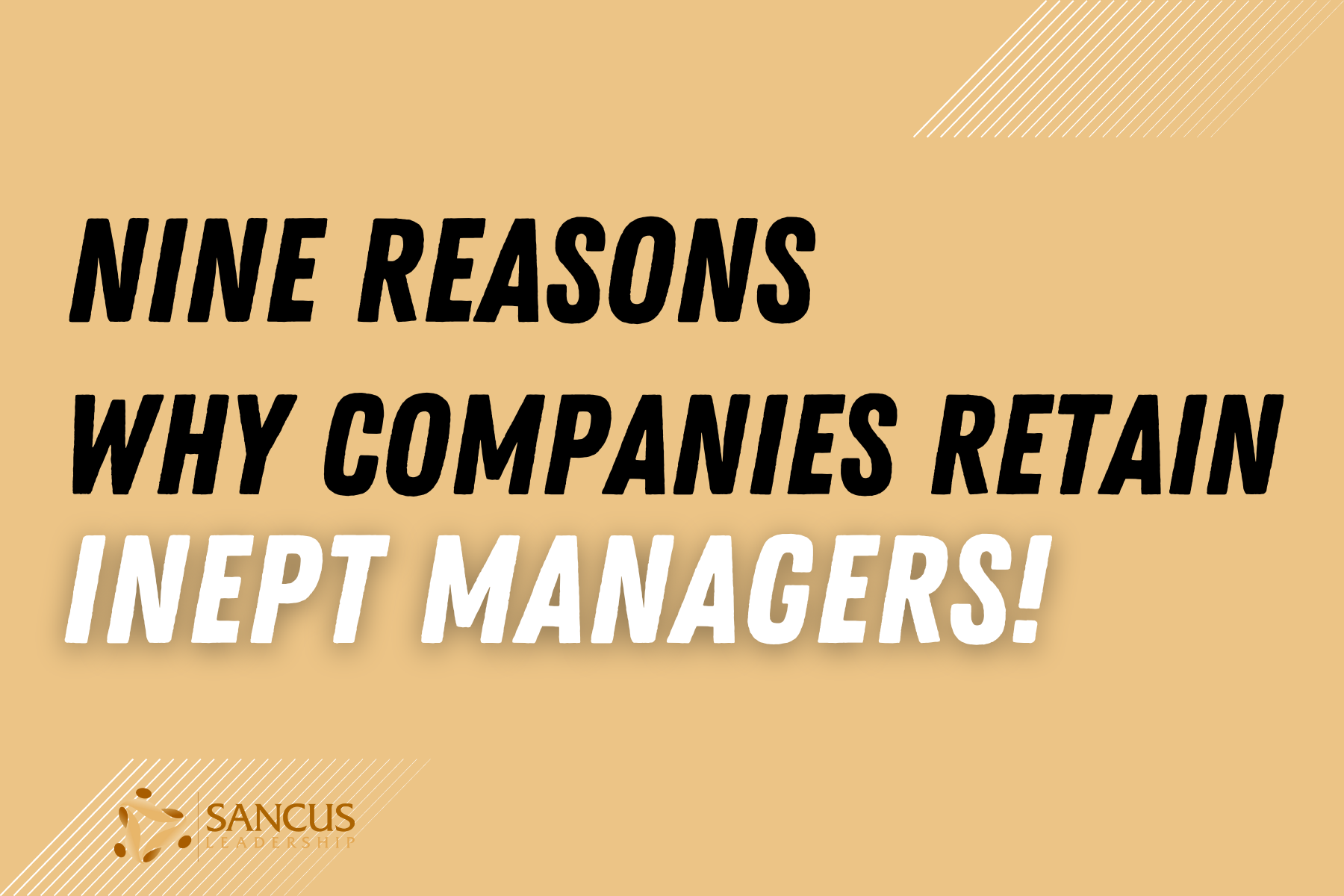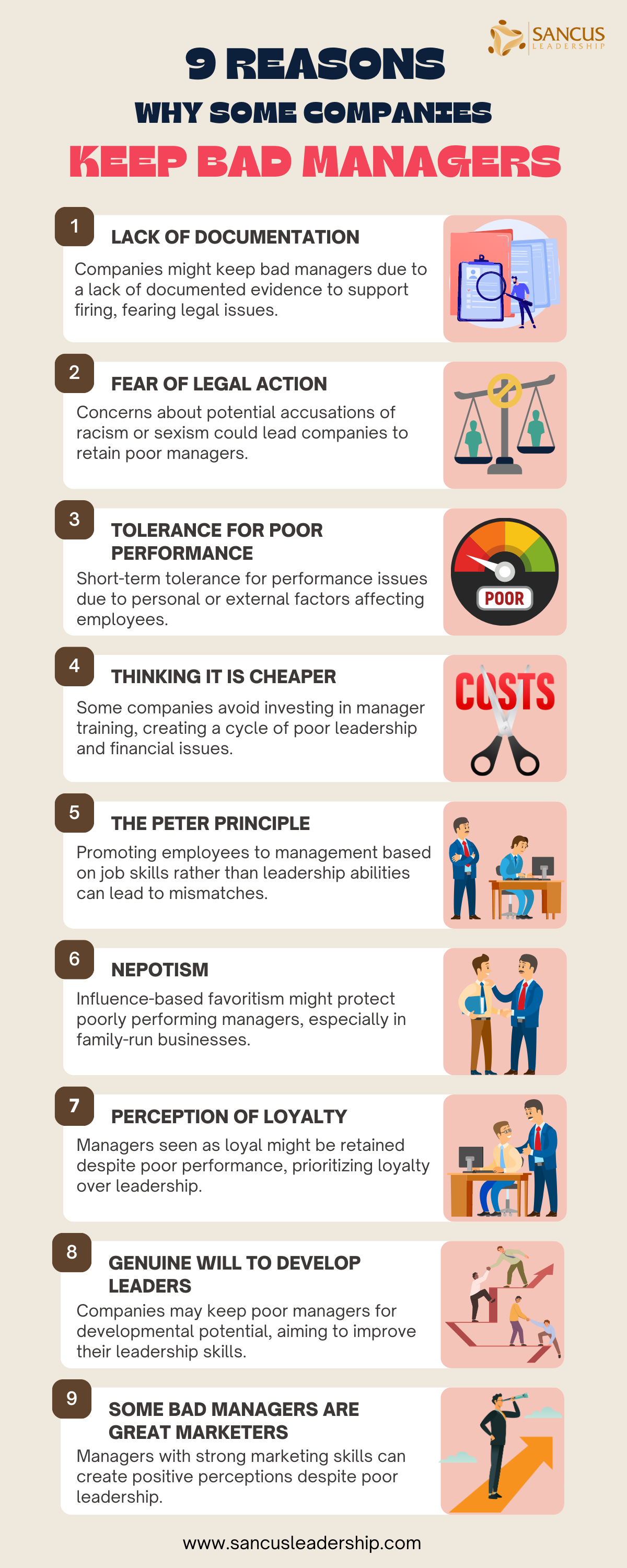Your cart is currently empty!

Strange Reasons Why Some Companies Keep Bad Managers!
Working with bad managers is the main reason people quit their jobs, and if you are like me, you have encountered one during your work life. My worst manager, by far, was the commanding officer of a Swedish contingent serving in North Africa. So why didn’t he get fired?
The main reasons companies keep bad managers include nepotism, the Peter principle, and a genuine will to develop bad managers into good leaders with training.
In this article, I will draw from my own experiences in the military and some civilian experiences from the corporate world. I will talk about the practical reasons and the emotional and relational perspectives on why we keep having to deal with poor leadership from incompetent managers.

Lack of Documentation
Sometimes, even though management wants to get rid of a poor manager, it isn’t possible due to not having the documentation to back the case up. In this time of transparency and worker rights, a company cannot just fire someone because they want to, as this might get them into serious legal problems.
Fear of Legal Action
With the recent year’s explosion of racial and gender tension, it is no surprise that employers are hesitant to fire people; keeping a lousy manager on the team might be a better option than risking being publicly accused of racism or sexism, whether or not it’s true.
Tolerance for Poor Performance
Companies have a tolerance for poor performance, especially in the short-term perspective. This is not necessarily bad because we all have times in our lives when we are not performing at our peak or when we have problems at home that impact our work life.
It is also the case that the Prices law tells us that 10% of the workforce does most of the work, which means if we judge people by comparison, we will always have low performers no matter how we recruit or train.
Thinking It Is Cheaper
Some companies might think they don’t have the money to pay for adequate training for their managers and that they will deal with it in the future. This turns into a circular egg and hen problem where poor leadership leads to less money, which leads to not investing in better leadership, leading to even worse.
The Peter Principle

Outside of the military, this is the most common way to promote people as far as I understand today’s workplace. The Peter principle says that employees get promoted to a managerial position because they are good at their job, not because they were good and potentially great leaders.
This often leads to a mismatch between their current skills and what they need to know to do an excellent job as a leader.
We also see staff promoted/moved into management positions as a reward for doing their job well. Which is fine in and of itself, but did they want the management role? Are they prepared for what being a manager and potentially a leader requires? The skills are not 100% the same and need practice to be successful.
Joe Francis
Nepotism

Nepotism is the process by which people of great influence favor friends and relatives rather than factors of merit. For example, in a family-run business, a poorly performing manager is more likely to be kept on the job if he or she is family rather than an external hire.
In the case of my commander in the Swedish armed forces, it turned out that he was in the same officer class and a really good friend to the previous unit commanders. It was highly likely that this guy was not promoted due to his leadership skill set (which was flawed with lying and incompetence; he once threw an office chair at the door) but rather as a product of knowing the right people.
Perception of Loyalty
Managers who perform poorly but who are seen as loyal to upper management are likelier not to be fired since loyalty is often more highly valued than abstract leadership performance.
A Genuine Will to Develop Leaders

Back in the military, we never got to choose the people who we were we worked with. You got assigned people to your team, and you will have to work on that relationship and somehow make the team come together and perform.
This put us in a situation where we had no option but to develop and improve every team member continuously. This is not necessarily bad since it forces you to deal with issues that you otherwise would have blamed on the individual and, therefore, would have concluded that he or she needs to get fired.
Companies might keep a lousy manager on the team because they see potential in this individual and believe everyone should have a chance to develop. But before they reach a level of proficiency, they will most likely perform poorly; that is the stage where the leader is in right now.
I genuinely think this is an excellent way of developing leaders and team members, but one must consider when to draw the line when there aren’t enough resources to justify further training.
Some Bad Managers Are Great Marketers

Poor managers with excellent marketing skills can put themselves in a bright light before the CEO and decision-makers. Most of us have met people like this; they are usually skilled at making a first impression and excel at creating short-lasting friendships.
Poor managers with excellent marketing skills can put themselves in a bright light before the CEO and decision-makers.
These are usually the leaders we initially appreciate and respect but later turn out to be deceiving and superficial. They are the people we consider managers rather than leaders.
Such was the case with the commander in Africa; he was appreciated by the people who had never met him more than once or had a discussion in which he did not agree with you. In that situation, he would become hostile and unable to listen to feedback. But when presenting himself during speeches or VIP visits, he appeared to have great leadership traits.
Final Thoughts
The most significant takeaway from today, I think, should be to avoid manifesting the destructive behaviors on this list. We want to be influential leaders who care for our people, the mission, and ourselves.
